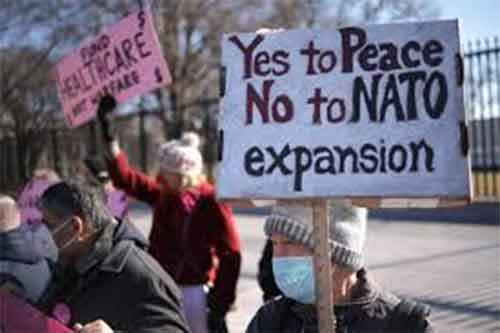
Putin is the most criticized person in western countries today. Repeated criticism of the invasion unleashed by him is justified, both because of the enormous distress caused to the people of Ukraine and the very serious threats posed to world peace and stability.
Mass protests against Ukraine’s invasion in several western countries are therefore justified. However the interests of world peace will be even better served if this concern is widened to take a serious, unbiased look at the various invasions unleashed in recent times by western countries or their close allies.
As is widely recognized now, there was not even the fig leaf of a justification for the Iraq invasion of 2003. In the case of the previous invasion of Iraq, there had been some provocation certainly, but solutions other than invasion were clearly available even then, but were not given a fair chance. The sanctions imposed were not justified either, and ultimately claimed more lives than the actual fighting. The two invasions and the sanctions together caused the loss of several hundred thousand lives, and left behind the very painful legacy of cancers, birth deformities and other serious adverse impacts of depleted uranium, as also a more divided and fractured nation which now actually spawned dangerous terrorist outfits.
Voices of warning were voiced within western nations which, if heeded, would have prevented these disasters. In 2003 Robert Byrd spoke from the floor of the Senate, “ Today I weep for my country…We say that the United States has the right to turn its fire-power on any corner of the globe which might be suspect in the war on terrorism. We assert that right without the sanction of any international body. As a result the world has become a more dangerous place.”
Further Senator Byrd stated, “The case this Administration tries to make to justify its fixation with war is tainted by charges of falsified documents and circumstantial evidence. We cannot convince the world of the necessity of this war for one simple reason. This is a war of choice. There is no credible information to connect Saddam Hussein to 9/11.”
This was just one of the several wise warnings from within the senior levels of governance. On the streets millions of people gathered to protest against the invasion. UN agencies monitoring sanctions issued warnings against the unfolding horror of their impacts.
However, there has been no effort yet, whether by the USA or its allies, to officially indict or punish even one of the senior pushers of these invasions and sanctions. As the cries for punishing Putin as war criminal become louder, it is well to remember this.
Similarly the impact of the invasive actions of the USA and its leading allies in several other countries should be examined in a completely unbiased manner to learn important lessons for future.The interests of world peace are best served not just by targeting one invasion, but examining all recent invasions to very sincerely explore possibilities of avoiding such disasters in future.
The USA and its western allies should also re-examine the entire course of their relationship with the Russian Federation after the break-up of the Soviet Union. The best policy option in the new circumstances would have been to embrace the Russian Federation, its leadership and people, in a new relationship of friendship and cooperation. This would have been very useful for world peace.
But the USA and the NATO instead followed a policy of continuously creating problems for the Russian Federation. There was much interference in the 1996 elections to ensure the victory of Boris Yeltsin, who in turn pushed indiscriminately a narrow big business agenda which led to mass impoverishment, millions of premature deaths and unprecedented decline of average life span of citizens from 67 years in 1985 to 60 years in 2007. This massive disruption pushed Russian citizens to seek a strong leadership which, even if undemocratic, could aggressively protect from hostile forces. Such tendencies were strengthened further when western powers went on extending NATO presence in countries very close to Russia.
In retrospect it is clear that lack of an enlightened policy lost for the west new possibilities of having the Russian Federation as a valuable, long-term friend and significantly improving prospects of world peace. Even today it is not too late to take remedial measures. Certainly the interests of world peace would be better served if the west makes a new beginning in some important respects.
